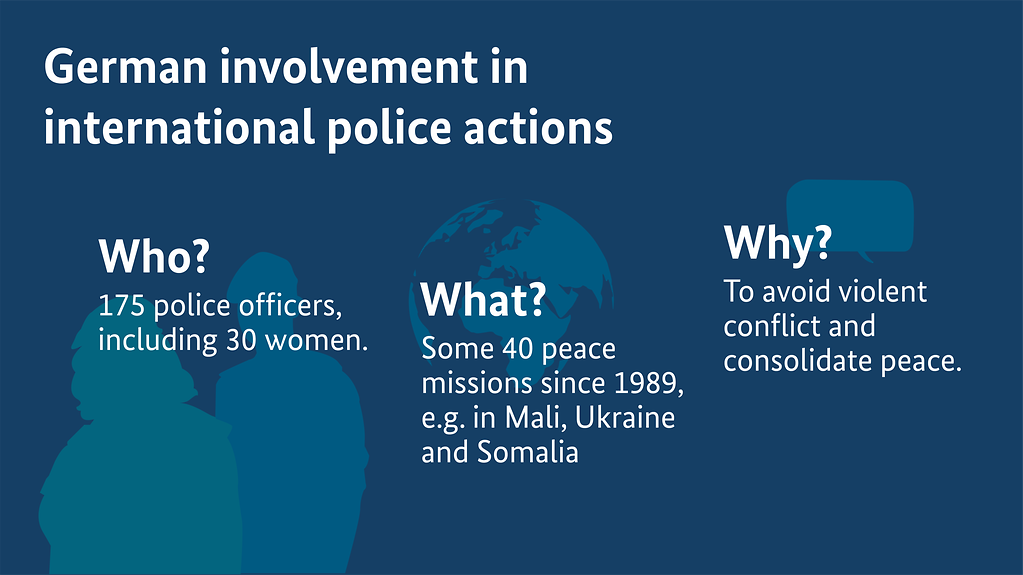International police missions
German police officers are deployed worldwide to promote peace and security. A comprehensive overview is provided by the report on German involvement in international police missions now approved by the Federal Cabinet.
3 min reading time

By sending police officers on international missions, Germany continues to contribute to stabilising fragile states and crisis regions.
The graph under the heading “German involvement in international police actions” shows the points:
- Who? 175 police officers, including 30 women.
- What? Some 40 peace missions since 1989, e.g. in Mali, Ukraine and Somalia
- Why? To avoid violent conflict and consolidate peace.
Photo: Bundesregierung
In 2020, Germany participated in numerous peace missions around the world, deploying 175 federal and state police officers as well as customs police personnel. The aim of German engagement is to bring about conflict resolution and stabilisation in crisis areas in a spirit of partnership. In doing so, police officers also make an important contribution to internal security in Germany and beyond.
From 1989 to the present, more than 10,000 federal and state police officers and customs police personnel have been deployed in some 40 mandated peace missions, in the bilateral police project GPPT in Afghanistan and, since November 2015, in Frontex-coordinated operations at the EU’s external borders.
Working for security worldwide
In 2020, the Federal Government deployed police officers in missions in countries such as Mali, Niger, Sudan, Somalia, Iraq, the Palestinian territories, Ukraine, Kosovo and Georgia. The bilateral police project with Afghanistan – the GPPT – was also continued in 2020, though it has since been discontinued.
German police forces are deployed in these crisis regions:
- United Nations missions, including in Kosovo, Darfur, Mali and Somalia. The missions focus in particular on protecting the civilian population, strengthening rule-of-law institutions and training local police forces.
- EU missions that fall under the Common Security and Defence Policy (CSDP), including those in Kosovo and Somalia, at the Rafah Border Crossing between Egypt and Gaza, and in Ukraine. The assignments range from providing training to advising the authorities.
- OSCE missions, in particular those aimed at monitoring the security situation, initiating dialogue and establishing a basis for talks between political and civilian actors.
- The German Police Project Team (GPPT) bilateral police project in Afghanistan, which has now ended, involved training police forces locally. A total of 77 German officers were deployed in Afghanistan in 2020.
- Frontex: Deployment in European Border and Coast Guard operations at the EU’s external borders, in particular in Italy, Spain, Greece and Bulgaria. German police forces are mainly responsible for registering migrants, checking documents, carrying out border surveillance and identifying travel and smuggling routes.
One key challenge facing the Federal Government is to ensure that these services provided abroad are compatible with operational requirements at home while at the same time being attractive to the personnel involved.
Continuation of German involvement
The Federal Government is committed to continuing Germany’s involvement in international police missions and aims to expand it further. Peace missions are also a way of tackling new crises on the ground by providing international aid – one example here is the current coronavirus pandemic – as well as supporting host countries within their respective mandates.
By sending German police officers on international police missions, Germany continues to make a vital contribution to stabilising fragile states and crisis regions. The assignments carried out are diverse, ranging from advising executives in security ministries and police authorities to civil police training and professional development programmes.
This also contributes significantly to combating the causes of displacement. Organised crime, terrorism and the resulting displacement and expulsion are transnational phenomena. Conflicts and crises impact on neighbouring states and sometimes even Europe. This makes effective, coordinated international action in crisis regions all the more important.